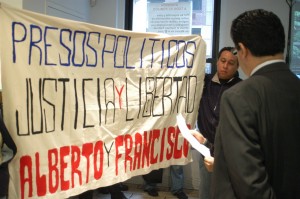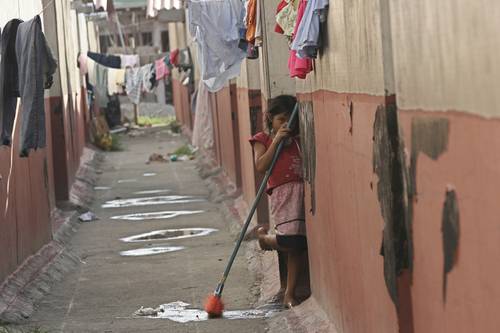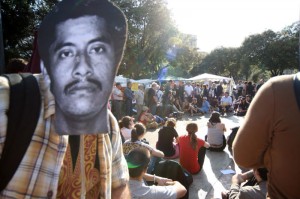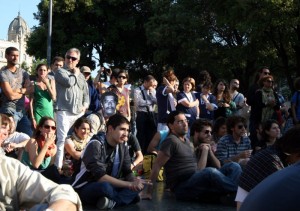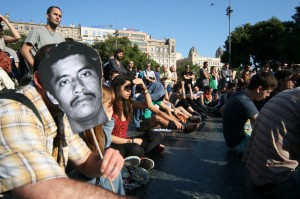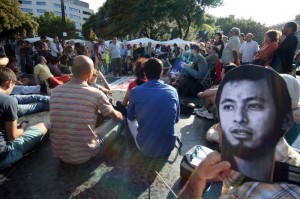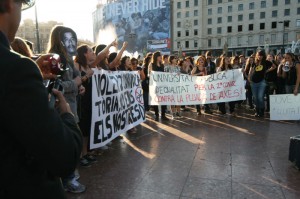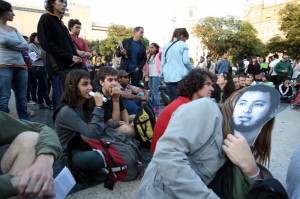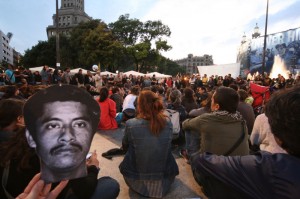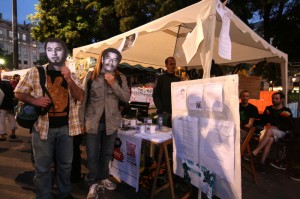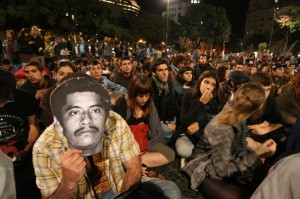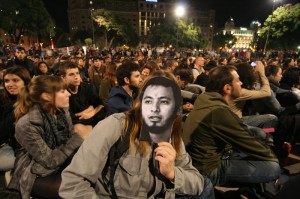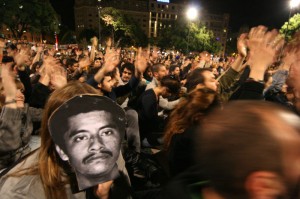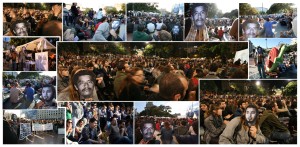Sorry, this entry is only available in Mexican Spanish. For the sake of viewer convenience, the content is shown below in the alternative language. You may click the link to switch the active language.
by Andalusia Knoll
Article published in NACLA: https://nacla.org/article/21st-century-solidarity-video-messages-and-other-campaign
Three of the videos referred to in the article can be found below.
On July 23, the Mexican government released the Bachajón 4, political prisoners from the southern state of Chiapas, who had been unjustly detained for over five months for defending their communal land from government-sponsored eco-tourist development. Their liberation was celebrated by indigenous groups across Mexico, international supporters, as well as by members of the Other Campaign, a Zapatista-aligned network launched in 2006 to unite those fighting from below and outside the electoral system. What is most unique about this story, however, is the role that international organizing and multimedia tactics played in the release of the political prisoners, and the fact that the campaign was largely led by a Zapatista-affiliated immigrant-based organization in Harlem, New York—Movement for Justice in El Barrio (MJB).
San Sebastián Bachajón is a Zapatista-aligned indigenous community in the heart of resource-rich Chiapas. For two years community residents had fought off multimillion-dollar government sponsored “eco-tourism” projects aimed at developing and exploiting the nearby Agua Azul waterfall, which is located on the San Sebastián Bachajón ejido, or communal land. These development projects came as part of the U.S.-backed Project Mesoamerica, formerly known as Plan Puebla Panama, which promotes militarization and megaprojects including superhighways, dams, and open-pit mines across Mexico and Central America.
As a community in resistance to what they call “the bad government” San Sebastián Bachajón strives for autonomy and implements economic strategies to fulfill that goal. The highway that crosses their land is highly trafficked by tourists traveling to and from the Mayan ruins of Palenque. To help alleviate poverty in their community, they installed a community-run tollboth. According to community members, the tollbooth has helped them to finance remedies for the sick, and build a community church.
Since the Zapatista uprising in 1994, Mexican political parties, regardless of who is in office, have attempted to co-opt members of autonomous indigenous communities by offering them much needed building supplies, food, and other resources in exchange for their political support. This has created divisions between those striving for economic and territorial autonomy and those cooperating with the government. In February 2011, tensions mounted when supporters of Mexico’s powerful Institutional Revolutionary Party (PRI) attempted to take over the tollbooth as a strategy to counter Bachajón’s autonomy by severing one of its lifelines. An ensuing confrontation resulted in the arrest of 117 Bachajón community members. Most were quickly released, but officials accused 10 people of shooting and killing a government supporter. They were held for months, and throughout their imprisonment they maintained their innocence. According to the Chiapas-based Fray Bartolomé de Las Casas Human Rights Center (FRAYBA), the detained did not have proper legal representation and lacked interpretation from Spanish to their native language, Tzeltal. FRAYBA also stated that it believed the PRI attack was orchestrated by the state government of Chiapas.1
San Sebastián Bachajón asked for support from Other Campaign member organizations and international allies. New York’s Movement for Justice in El Barrio answered the call. Coordinating with groups in over a dozen countries on four continents, they declared a national day of action for Bachajón on March 7, 2011, a little over one month after the imprisonment. People in San Sebastián Bachajón then produced a video message to the MJB that starts deep in the Lacandón Jungle.
“We do not want to give up our [territory] because it is where we work to cultivate food for our children,” says Amalia, a Bachajón community member speaking in Tzeltal. She continues talking about the sacredness of their natural resources like the Agua Azul waterfall.
“We thank all the organizations that have opened their hearts to us and are struggling with us to recognize the problems that we face as an indigenous community,” says Juan, another member of the Bachajón community speaking directly to the camera.
Within weeks, the Chiapas State Attorney General’s Office, which was holding the detainees, responded by releasing half of the 10 prisoners. This first message was just the beginning. In early April 2011, MJB coordinated five days of global action for the Bachajón prisoners. MJB members protested in New York City for two days at the Mexican Consulate, and Canadian supporters protested outside the consulate in Montreal.
The Chiapas police responded to the days of action with repression. According to an MJB press release, on April 9, 2011, 800 police and military descended on the community, violently displacing community members.
“It is clear that these acts of aggression were provoked by the organized resistance of the people of Bachajón and by the national and international pressure,” the press release read the following day. “We must not rest until our five brothers are in complete freedom.”2
MJB called for another round of global action. Over the coming months, MJB and the Bachajón community would produce three more videos. They were translated into English and French and shared both on the Internet and during coordinated actions in France and Canada. In a following video message, MJB members spoke directly to those in Bachajón about the difficulties they face as Mexican immigrants in New York, fighting displacement from their homes and neighborhood, and their struggle to maintain their cultural identity.
By July, the international pressure had grown too strong. The Mexican government dropped the charges, releasing one political prisoner in early July and the remaining four—the Bachajón 4—in late July.
At a press conference in San Cristóbal de las Casas, following their release former political prisoner Domingo Pérez Álvaro said the Mexican government continues to repress them for their defending the earth, natural resources, and their ejido.
“As organization members we defend what has been left by our ancestors and great grandparents. But the government wants to dissolve our organization. They don’t want to see indigenous communities unified in defense of their land,” added Álvaro.
Conflicts over land and natural resources between indigenous communities and government forces is an age-old story that has been played on repeat across the Americas for the past 500 years. In Chiapas, these conflicts have surfaced with increasing frequency since 1994, when the indigenous Zapatista Army for National Liberation rose up to declare its autonomy and resistance to the neoliberal projects that it viewed as its death. To repress the Zapatistas the government has employed numerous paramilitary operations and encouraged the incursion of political parties, especially the PRI, to attempt to buy off members of indigenous communities.
“Today’s war is for the land,” wrote Uruguayan journalist Raúl Zibechi in a letter sent in May 2011 in solidarity with those in Bachajón. “To appropriate the life that it provides for and reproduces. Therefore, indigenous peoples and campesinos are the primary obstacles that must be done away with. Ever since capital decided that everything is a commodity for doing business and accumulating more capital, no space on earth remains—not even the slightest corner—that can free itself from this ambition.”3
The conflict that San Sebastián Bachajón suffered with the PRI is not new, but the role of multimedia and international organizing in the release of the Bachajón prisoners is. For these organizations, this style of organizing has largely emerged since the Zapatistas launched the Other Campaign in 2006. Fed up with the oligarchic Mexican political system, the Other Campaign called on Mexican supporters to oppose the 2006 presidential elections and instead focus on organizing around their own local collective struggles. Subcomandante Marcos and thousands of supporters traversed 32 Mexican states listening to community concerns and uniting, as the Zapatista’s 6th Declaration from the Lacandón Jungle states, “resistance groups [to] learn about the struggles they face in their communities and rally support against the neoliberal and capitalistic federal political system.”
Since then, the Other Campaign has served as a common ideological platform that helps mobilize support around certain campaigns in Mexico and in Mexican immigrant communities abroad. Groups around the world have embraced the spirit of the 6th Declaration, and stood in solidarity with the Other Campaign members.
MJB, founded in 2005, quickly joined the Other Campaign from abroad. As an organization largely composed of low-income Mexican immigrants living in the rapidly gentrifying neighborhood of East Harlem, they mobilize against housing evictions and greedy landlords and connect this struggle to the effects of neoliberalism and the North American Free Trade Agreement (NAFTA) that displaced them from their Mexican homeland. (Most MJB members were forced to migrate to the United States from their rural state of Puebla, after NAFTA went into effect in 1994 and subsistence farming because increasingly difficult due to the sudden influx of low-priced genetically modified U.S. corn.)
Also commonly referred to as the Other Campaign NY, MJB has over the years organized encuentros, or meetings. With their unique style of urban zapatismo, MJB members and encuentro participants have shared their stories of struggle confronting gentrification in NYC, ending repression of queer youth of color, stopping wage theft of low-wage workers, and more.
“Rebels who are fighting for dignity and against displacement came together to voice their presence, their rage, their struggle, and their dreams,” MJB described of their first and second encuentros in 2007 and 2008 in a June 2009 communiqué. “We broke down the fences that power constructs to divide us, we listened to one another’s voices, and we learned from one another.”
This is also the essence of MJB’s use of multimedia tools that can transcend artificially created borders and build solidarity between immigrant struggles in the United States and resistance to neoliberal megaprojects abroad. The videos are produced collectively, with members deciding on the scope and content of the video. Throughout the years they have brought the messages of South Africa’s Shackdwellers’ Movement—Abahlali baseMjondolo—fighting forced evictions; campesinos in San Salvador Atenco, Mexico, struggling to free their imprisoned family members; and more recently the political prisoners of Bachajón.4
“We think that the borders are not an obstacle to our struggle. The struggle doesn’t have borders,” says MJB member Filiberto Hernández. “Really we can do whatever we can to arrive at them, and cross them with our screams. We are destroying these borders and have traveled to many places in Mexico, here in New York, and in Europe presenting these videos.”
In 2008 and 2009 hundreds of MJB members were fighting eviction by the London-based transnational real estate company Dawnay Day. To bolster their fight, MJB traveled to England, France, Scotland, and Spain to meet with people who were also facing eviction by the same company. MJB was eventually victorious in this fight; the company sold the buildings and residents were not forcefully evicted. According to Hernández their transnational organizing helped them connect with many people in Europe who subsequently joined the struggle to liberate the prisoners of Bachajón and spread the video messages.
Clearly the liberation of the Bachajón prisoners was the joint work of many forces, but this victory shows that independent media and YouTube videos can play a key role in political-prisoner struggles.
In 2006, hundreds of people were arrested in San Salvador Atenco, a town about 15 miles northeast of Mexico City, during a brutal federal police raid following a pair of demonstrations over flower-vendor restrictions and education reforms. Twelve people received hefty prison sentences, including Ignacio del Valle Medina, who was charged with aggravated kidnapping and sentenced to 112 years in jail. In reality, the politically motivated sentence was a move to sanction Del Valle for his role as the leader of the People’s Front in Defense of Land, which had been fighting to block the construction of an airport on communal lands in San Salvador Atenco. During Del Valle’s imprisonment, MJB held Skype teleconferences with his family members, bringing their voices to the United States during encuentros and regional meetings such as the Allied Media Conference and U.S. Social Forum. After a four-year national and international struggle, Del Valle and other political prisoners from San Salvador Atenco were freed just days after the June 2010 U.S. Social Forum in Detroit.
“When there are voices from abroad denouncing what’s happening in this country, the government listens,” explains Del Valle. “Without these brothers and sisters, we wouldn’t have been freed. It shows us that our voice of liberty doesn’t have limits and our shouts for freedom and justice do not have borders.”
This style of international solidarity has deep roots. Matt Meyers—a longtime activist who works on political prisoner issues in the United States—says that over the past 40 years there have been various international efforts to demand the freedom of black power and Puerto Rican and Chicano activists in the United States. During the 1980s many U.S. university students were active in the fight for the liberation of political prisoners under apartheid South Africa. Meyers believes that “there is a strategic necessity for transnational struggle.”
“With international organizing we can be two fists striking the same opponent with the same blow,” he adds, paraphrasing Samora Machel, a revolutionary leader and former president of Mozambique.
With the birth of the Occupy Wall Street movement, Movement for Justice in El Barrio has strived to connect zapatismo with the cries of the 99%. They have collected thousands of signatures from occupiers denouncing increasing paramilitary repression of zapatistas. They also recorded a video message of solidarity from Occupy Wall Street and projected the video in Chiapas at an indigenous training center during a Zapatista-aligned Anti-Systemic Seminary at the end of 2011 and beginning of 2012.
Capital crosses national borders with ease, immigrants cross with great difficulty. International solidarity among organizers, activists, and social movements can be a powerful transformative force. With its video messages Movement for Justice in El Barrio has been able to successfully transcend borders and wage successful battles for the liberation of political prisoners using the innovative technology of the 21st century.
Andalusia Knoll is a Brooklyn-based multimedia journalist, educator, and organizer. She has reported for Upside Down World, Left Turn, Democracy Now!, Free Speech Radio News, and TeleSUR. In New York, she organizes for farmworker justice and against deportations and teaches radio drama.
1. Centro de Derechos Humanos Fray Bartolomé de Las Casas, “The Frayba Report: San Sebastián Bachajón and the Struggle for Natural Resources,” Radio Zapatista, February 24, 2011.
2. NACLA, “Global Action for Release of Indigenous Zapatista Supporters in Mexico,” April 22, 2011.
3. Raúl Zibechi, “Carta de Raul Zibechi en apoyo a Bachajon y al zapatista Patricio Dominguez Vazquez,” Multimedios Cronopios, May 6, 2011.
4. Movement for Justice in El Barrio, “From El Barrio to Durban,” Zapagringo (blog), October 1, 2009.
Three of the videos mentioned in the articles can be seen here:
Third Message from San Sebastián Bachajón:
http://www.youtube.com/watch?v=R4frTkfDkuc
Message from The Other Campaign New York to San Sebastián Bachajón:
http://www.youtube.com/watch?v=rYCF9N6yldQ
http://www.youtube.com/watch?v=XA7nc-LoypM


